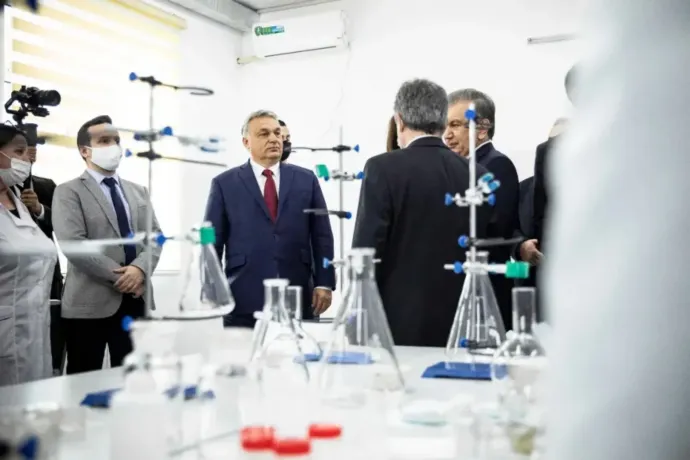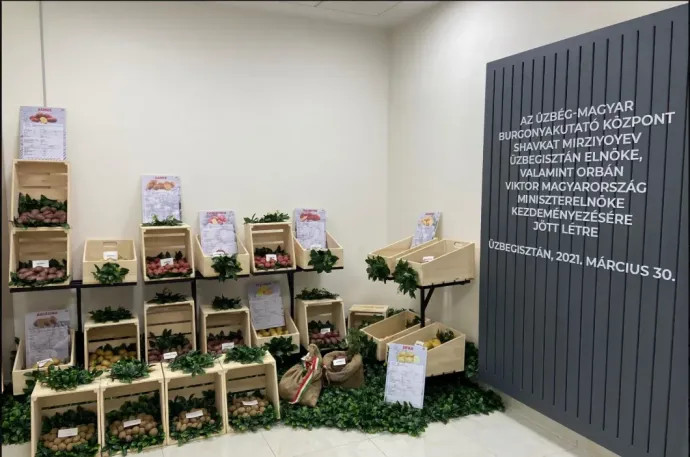What has the Uzbek-Hungarian Potato Research Centre been doing for the past four years? We found out

“Besides bread, potatoes are another very important foodstuff, which not only has a past but also a future in the region,” Hungarian Minister of Agriculture István Nagy said in 2021, when the Uzbek-Hungarian Potato Research Centre was founded. The importance of the project was demonstrated by the fact that the cooperation was announced as a joint initiative of Hungarian Prime Minister Viktor Orbán and Uzbek President Shavkat Mirziyoyev. However, the press's interest in the institution's legendary name soon died down, and the project has hardly been heard of since then. We asked Csaba Gyuricza, Rector of the Hungarian University of Agricultural and Life Sciences (MATE – Magyar Agrár- és Élettudományi Egyetem), for help in finding out what potato researchers from the two countries have been doing in recent years.
When you see the name of the Uzbek-Hungarian Potato Research Centre, the first question many of us might ask is: why Uzbekistan? What's so special about Uzbek and Hungarian potatoes that the two countries wanted to set up a research centre together? The answer concerns a much wider area than just potato production, and both sides have very different hopes for the project. Let us begin with the Uzbeks, who presumably had a greater need for cooperation!
Potato diplomacy
At the time, HVG reported that the price of potatoes, one of the most important foodstuffs in the Central Asian country, had risen by 90 percent in 2017 and 42 percent in 2020 annually. And the explanation is simple: in the ten years before the centre's establishment, Uzbekistan's population exploded by a factor of almost one and a half (to 34 million in 2020), while the per capita potato consumption rose from 30 to 100 kilos a year – a rate that local potato growers were not able to match. In 2020, Uzbekistan's population density was only three-quarters that of Hungary, and the proportion of arable land in the two countries is similar. However, due to the dry Uzbek soil and the unfavourable warm climate, it seems that, with current techniques and potato varieties, production has reached its maximum potential.
As a result, in recent years, the country has had to import more and more potatoes, which has had an impact on prices. In order to alleviate the situation, the Uzbek government was able to achieve a rapid improvement only by using the know-how and technology of other countries, which came in handy for Hungary.
"We sail under a Western flag, but in world economy, the wind is blowing from the East" – Viktor Orbán said in his first speech on the Eastern opening in 2010. The essence of the strategy was about orienting the Hungarian economy – until then, dependent on the West – towards the fast-growing economies of the East, ensuring that Hungary would also share in the benefits of Asian growth. However, its effectiveness was not really reflected in the figures, and finally, in 2015, Péter Szijjártó announced the end of the strategy.
The term Eastern Opening, which was relaunched in 2021, has been in recent years applied to a large number of projects from different countries and across a wide range of investment areas. In addition to Chinese and South Korean battery factories, this includes, for example, the friendly relationship with the countries of the Turkic Council – from 2021 the Organisation of Turkic States (OTS) – of which Uzbekistan is a member. However, the strategy should be understood not only as investment projects with an economic basis, but also as cooperation that creates new networks of contacts or generates new knowledge, such as a research centre could prove to do.
Thus, this can be viewed as Hungary rushing to the aid of the Uzbeks, who were struggling with cultivation problems, and since the costs of the institute were entirely covered by the Uzbek side, Hungary was able to score some good diplomatic points with the Central Asian country by transferring knowledge, technology and different potato varieties, while opening up a new channel for research. Moreover, if all goes well, the cooperation with Uzbekistan could even generate revenue in the future.
It was with this in mind that in 2021, the Uzbek-Hungarian Potato Research Centre was established in Tashkent, Uzbekistan's capital of three million people, with Hungarian researchers from the Hungarian University of Agricultural and Life Sciences. None of them live in Uzbekistan; instead, the work of the Tashkent institute is run from the MATE's already existing Hungarian Potato Research Centre, and they only travel to the country two or three times a year.

New opportunities
According to Csaba Gyuricza, it was a big mistake on the part of the Hungarian press to make fun of the newly established research centre in 2021 because of its name, as its establishment was, in his opinion, the basis for the development of agricultural relations in Central Asia. Since then, MATE has established a joint master's programme with the University of Tashkent, while a centre for agricultural innovation has been set up in neighbouring Kyrgyzstan and a training institute in Azerbaijan. The Rector said that it was the establishment of the research centre that paved the way for these opportunities. This does not mean that they are not looking for the same kind of cooperation to the west of us, for example, they have bilateral master's programmes with Austria or the US and have been present on the Central European market with their seeds for several decades.
The systematic breeding of potatoes began in Hungary in 1905, and Gyuricza says that the great advantage of the domestic potato varieties developed since then over the Western varieties currently used in Uzbekistan is that they are more resistant to diseases and better adapted to the drier weather in the country, which would make it possible for the Uzbeks to produce more.
For this reason, MATE researchers see a business opportunity in the expansion of Hungarian potatoes to the Central Asian market. Gyuricza pointed out that from MATE's side, the project is being managed by the for-profit MATE Agrárcsoport Ltd., a company that distributes seeds and propagating materials, which is a good illustration of one of the university's goals being the generation of revenue through the collaboration.
But how can they generate revenue from this? If propagation proves successful in Uzbek soil and under local weather conditions, the centre can start selling the propagating material to local producers, who would pay a licence fee for the Hungarian varieties. Five of the six potato varieties from Keszthely were successfully trialled in 2023, and since then, they have been included in the Uzbek variety register, which is a condition for their release to the market, according to the rector. The university, therefore, expects that by 2026, potatoes grown from Hungarian propagating material will be available on Uzbek shelves.
Gyuricza also said that at the moment the multiplication is being done on 1.7 hectares, but by the end of next year they are aiming for 10 hectares. This is important because the seed potatoes grown this way can then be sold to growers, so the larger the area grown, the higher the income.
Potato research has gained international momentum over the past two decades, as global warming is expected to reduce the yields of potato varieties currently on the market. China, for example, the world's biggest producer of potatoes, is conducting a three-year experiment to study the impact of global warming on vegetables. And the results are ominous: for example, a three-degree rise in temperature could reduce the size of the potatoes examined in the linked article by almost half. To compensate for the changes, more and more countries are starting to develop new varieties that are more tolerant of higher temperatures.
According to Csaba Gyuricza, in Hungary, potato breeding for extreme weather conditions has been going on for years. Another goal of MATE would be to develop a new potato variety in cooperation with Uzbekistan – but this is still a future plan. The rector said that the collaboration is for an indefinite period, and if it proves successful, the potato research centre could continue the joint work for a long time to come.
In the past few years, there have been several news reports pointing to the strengthening of Hungary's economic and diplomatic relations with Uzbekistan. In 2022, the Hungarian OTP bank acquired the Central Asian country's fifth-largest (formerly state-owned) bank, while in 2023, Uzbekistan announced that it would open an embassy in Hungary. In May this year, the Organisation of Turkic States held its summit in Budapest, where OTP President Sándor Csányi and Viktor Orbán's son-in-law, István Tiborcz, were joined by several Hungarian businessmen to discuss investment opportunities with the enthusiastic Uzbek delegation.
For more quick, accurate and impartial news from and about Hungary, subscribe to the Telex English newsletter!